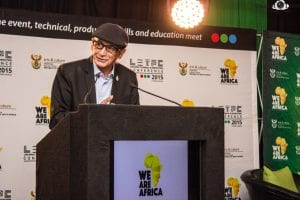International political and war photojournalist by trade, former station manager of Fine Music Radio and former programming manager at P4 Smooth Jazz Radio, as well as the producer of e-TV’s well-received “Jazz Café”, Rashid Lombard is a legend in his own right, with almost 20 years’ experience managing music concerts and events.
Rashid was one of the speakers at the LETPC 2015 conference and gave a talk on integrating live event technical and production skills training and skills development in the workplace.
Meetings had the opportunity to do a Q&A with him.
What is the most important piece of knowledge you have acquired during your years as the festival director of the Cape Town Jazz festival?
The importance of communication.
During such a long and colourful career you are bound to have a few memorable stories, please tell us about your funniest experience in the industry?
It was the North Sea Jazz Festival 1998 in The Hague and I was attending the festival as an accredited photojournalist. There was one particular artist I wanted to meet and proceeded to the hotel situated next to the Concert Gebou.
Approaching the security at the door and scheming how to pass him…. When he said “Welcome Mr Santana” and I was in! In the lounge I found Carlos Santana and relayed what just took place. We had a good laugh and his interest and knowledge of South Africa was passionately evident.
What have been the challenges you have faced in this industry and how have you overcome them?
Challenge – Keeping faith in people
Overcoming – Looking for the good in people
Challenge – Adversity and challenging times
Overcoming – Not losing focus
Challenge – Rejection
Overcoming – Accepting the opinion of others
Challenge – Sponsorship
Overcoming – Getting expert advice, input and contracting such an entity
How can the integration of live event technical and production skills training and skills development in the workplace be increased or promoted?
The integration of live event technical and production skills training and skills development in the workplace be increased or promoted by the following:
• Involvement of all service suppliers in understanding the critical importance of the workplace in respect of skills
• Active involvement with the SETA’s
• Use of skill interventions
• Alliance wherever and whenever possible with Entry Level On-the-job Training Programs and Training providers
• Planning involvement at the outset of pre-production
• Improved communication between stakeholders
• Using forums such as the Transformation Forum to enhance sector focus and information exchange
If one considers that a live event is in a way no different than a construction site, with both offering multiple Workplaces driven by a single project to speak. In the live event technical and production sector there must be at least twenty (20) if not more Workplaces on each and every live event (of a 1 000 + capacity) with less Workplaces on smaller live events due to scale.
Workplaces offer significant opportunity for specific skill interventions and on-the-job training and development to integrate live event technical and production skills training and skills development
Is there anything you would like to add?
Attending the inaugural Live Events Technical & Production Conference 2015 in Johannesburg, organised by the South African Roadies Association (SARA) is the most important and inspiring gathering I have attended in South Africa. The move towards establishing a skills academy in live events technical and production first in Joburg then to all provinces is an absolute necessity for up skilling our youth in a career path and eventually job creation.








